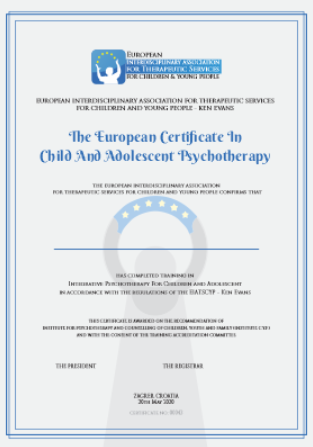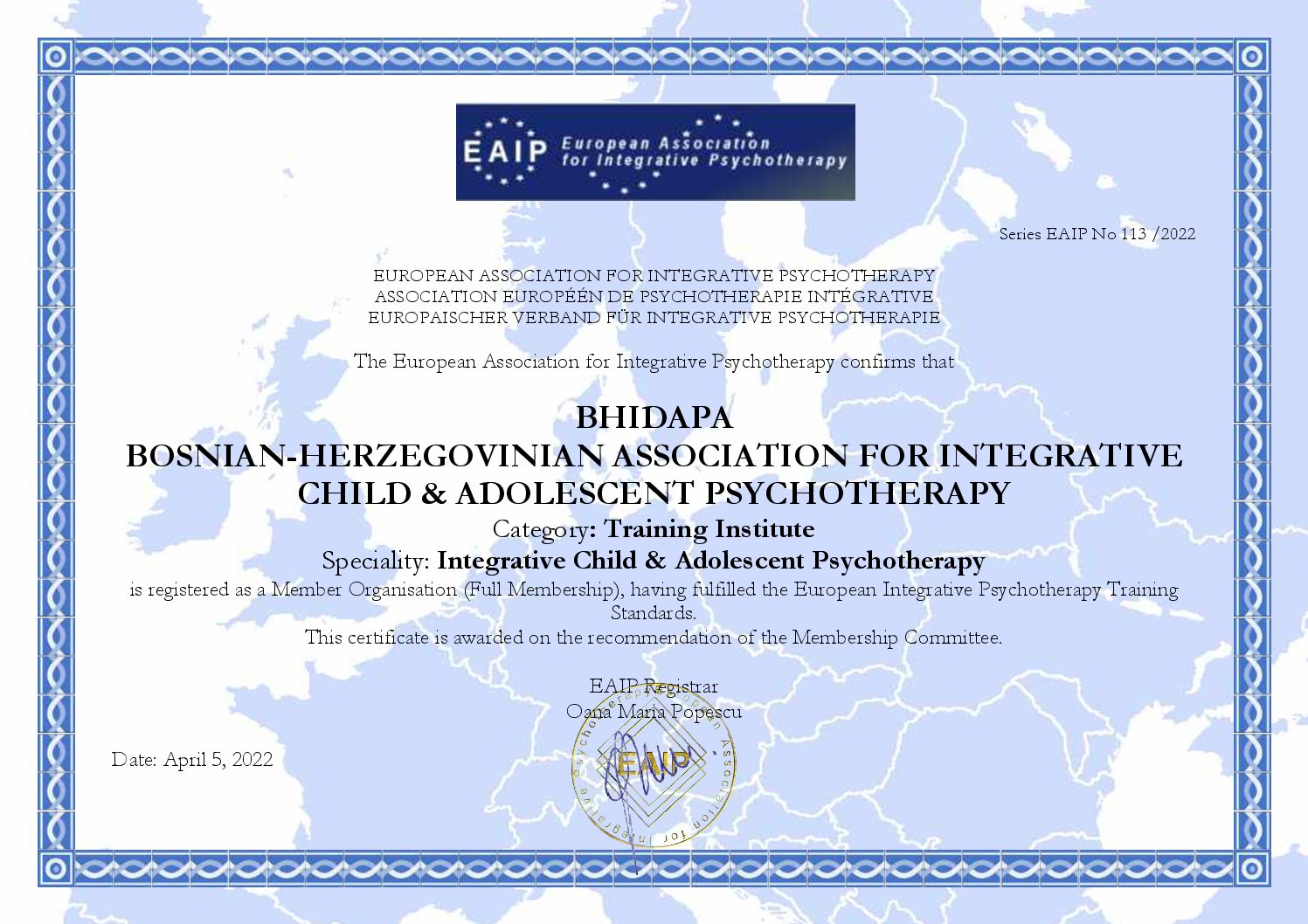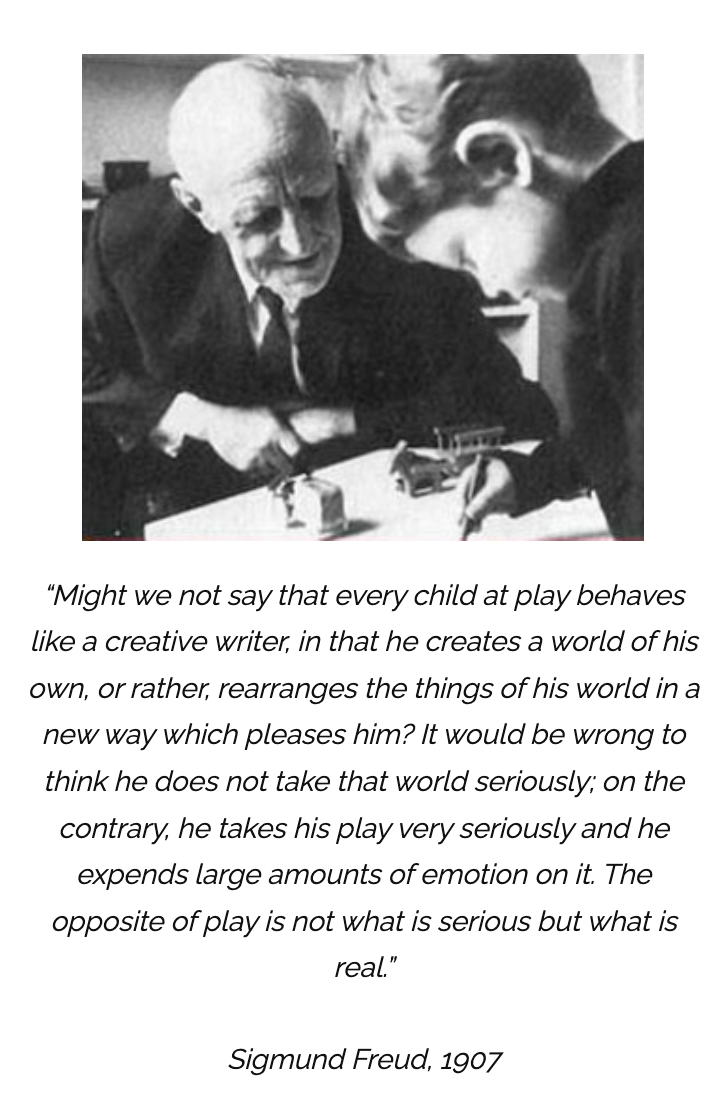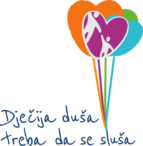Postgraduate degree in integrative psychotherapy
for children and adolescents
About the postgraduate educational program
Psychotherapy of children and adolescents differs significantly from the psychotherapy of adults, and this especially refers to the role of the therapist, relationship and cooperation with parents, because the acceptance of therapy depends on cooperation with parents.
A psychotherapist who wants to work with children and adolescents must have special additional education on the application of appropriate therapeutic techniques depending on the bio-psycho-social stages of the child’s development and the child’s difficulties, as well as relationships with parents and the environment.
Therapeutic techniques and skills are modified according to the stages of the child’s development, the level of education, on which the choice of projective media depends. The role of the therapist in therapy with children and adolescents is very complex because the therapist creates security, takes responsibility for the boundaries and ethics of the process, and the child’s internal psychological processes and relationship with parents are included in the therapeutic relationship. New relationships created through therapy are important for all later relationships.
The special weight of psychotherapy for children and young people stems from the child’s problems with motivation, reduced retrospective capacity and difficulties in the time perspective. A special difficulty is the preoccupation of the child’s ego with defenses from the therapist, which is especially pronounced in adolescents, and which creates difficulties in establishing relationships.
The Child and Adolescent Psychotherapy Program is based on a developmental approach to children and youth incorporating a humanistic and integrative approach / Psychoanalysis, Gestalt, TA, and Self Psychology, Intrasubjective Theories, Relationship Theories, and Neuroscience.
The development perspective is incorporated in the works of Bolby, Winnicott, Stern, Schore, M. Mahler, M. Klein and others.
The program prepares candidates for professional and academic experience with special emphasis on clinical skills, professional competence, personal development, supervision, capacity for multidisciplinary and intersectoral cooperation, meeting the criteria of good clinical practice that ensures a high level of education and research.



The basic philosophy of the program
is based on the following:
- The child-parent relationship that is most important for creating the internal psychological structure of the child and adolescent
- An internal child structure that affects relationships with the environment that tend to repeat history and create a life script and shame
- Self that is not an entity but a continuous process that is social, affective and structured through relationships with parents and other important people, and is shaped through social, economic and cultural characteristics
- Defenses that defend children from change, in part out of security, and seek to maintain the status quo
- Resistances to feelings that come from the past in the current context of the child’s life, but also indicate possible therapeutic interventions
The basic rules of psychotherapeutic treatment, regardless of basic approaches, include:
- Good knowledge of developmental stages
- Knowledge of family dynamics, which is important because through it the child perceives the world and himself in the world and transfers the resulting experiences to all other relationships later in life
- Knowing other important people in the child’s life
- Knowledge of protective and risk factors
- Knowledge of neuroscientific knowledge
- Legal frameworks on the protection and welfare of children
Target group
This program is intended for people who want to become experts / specialists in child and adolescent integrative psychotherapy.
The diploma in integrative psychotherapy for children and adolescents is intended for those who want to become child and adolescent integrative psychotherapists and provide integrative psychotherapy in working with children, adolescents and their parents. In order to successfully complete this educational program, the student must acquire professional and academic knowledge and experience with special emphasis on clinical skills, professional competencies, personal / personal development, supervision, capacity for multidisciplinary and intersectoral cooperation, meeting the criteria of good clinical practice. high level of education as well as research. The student must be able to understand the developmental stages of the child and adolescent and be motivated to help, understand and intervene to reduce psychological difficulties and support the child, adolescent, family towards growth, development and overall mental health and well-being, respecting the Convention on rights of the child, child protection protocols and legal provisions.
Conditions for the enrollment
Candidates who have a degree in academic studies (faculties of humanities, medicine or social sciences), worth 180 ECTS, can be included in the training for psychotherapists. It is necessary to submit the last academic diploma, online form for applying to the educational program, online form for membership and conduct an enrollment interview with the educational board.
If the candidate meets the above criteria, by signing the contract, the applicant acquires the conditions for enrollment in the educational program.
The student is entered in the book of student registers and in the registry book, and receives an education plan and program, index and code for the electronic library.
Note: If a student does not meet the requirements of the above requirements for inclusion of students in education, but has completed undergraduate and graduate university studies or integrated undergraduate and graduate university studies in another field, must have completed the study of propaedeutics psychotherapy.
Standards followed by the educational program
The educational program is implemented in cooperation with Institutom D.O.M. – Institut za psihoterapiju i savjetovanje djece, mladih i obitelji, poštujući europske standarde:
- EIATSCYP-Ken Evans (Umbrella European Associations – European interdisciplinary therapeutic service for children and young people based on the basic “Curriculum and training program created by the European Center for Psychotherapeutic Studies (EUROCPS) – Offices in France and United Kingdom Definitive Document and Handbook for Candidates-in-Training for the award of Diploma in Psychotherapy with Children and Young people -Dip. Psych. C&YP” (Evans, Hewit Evans, 2009),
- EAIP
- EAP
- EUROCPS
- IPSA
- UN Convention on the Rights of the Child (UNCRC)
- UN PSEA regulations,
- Child Protection Policy
- and a clearly defined WHO approach on primary, secondary and tertiary prevention (Integrating mental health into primary care : a global perspective)
Manner and dynamics of conducting education
Education is, as a rule, conducted once a month, extended weekend (16-20 hours), with summer and winter breaks.
The educational program is performed in two ways:
1. classic way: face-to-face, in the premises of the Center or in the provided premises that ensure the uninterrupted holding of education
2. distance learning: online via the Zoom platform.
- Each educational year consists of 10 modules.
- Education that monitors epidemiological measures,
- European recommendations and standards is provided
- The program is conducted in Bosnian / Croatian / Serbian and English.
The modules are led by eminent experts from our country, region and the world. - The training is conducted in cooperation with and respecting the standards and recommendations of EIATSCYP, EUROCPS, EAIP and EAP.
The duration, time and price can be exceptionally increased when the lecturers are foreigners and when the modules last longer than three days.
The curriculum of the program includes the following areas:
- Theories of child and adolescent development, including sexual development
- Attachment theory
- Neuroscience
- An understanding of other psychotherapeutic/counselling approaches
- A theory (s) of change
- An understanding of socio-political and ecological issues in relation to psychotherapy/psychotherapeutic counselling with children and young people.
- Theories of pathology/dysfunction
- Theories of assessment and intervention
- Child protection and anti-oppressive practice
- Interdisciplinary/Multi-agency collaboration
Educational program consists of:
- Theoretical part and research work
- Presentations
- Discussion
- Role playing
- Practical work in small groups and large groups
- Active work including personal therapy
- Demonstration of practical work
- Self-assessments and assessments
- Exam
- Supervision of clinical practice
- Development of skills and competencies
Students are encouraged to develop reflective and critical thinking, the ability to synthesize and analyze, creativity, active participation.
Organizationally, each module includes:
- Group process
- Theory, methodology and research
- Practical exercises in small and large groups
- Demonstration of practical work (personal therapy / supervision work)
Education groups are closed with a constant number of students. The open module is open to students of different educational years and / or students from other schools / institutes.
The module can sometimes be open, in which people who deal with daily work, psychotherapy, treatment, upbringing, education of children and youth, and protection and promotion of mental health of children and youth and their well-being, with a fee for the same .
The group process is a closed type and is intended exclusively for students of the educational program.
Assessment:
It is important that each student has the opportunity to show their knowledge and what they have learned through experience. In order for different styles, abilities and areas of students’ future development to come to the fore, different methods are used, which include seminar papers, presentations and answering questions related to them, assessment and self-assessment.
The final exam includes a case study, presentation of the theoretical part and demonstration of live psychotherapeutic work.
Duration and structure of 4.5 years of training
The training lasts 4.5 years, and after completing the training and successfully passing the final exam, candidates receive a diploma of BHIDAPA, with which they apply for and which automatically allows you to apply and obtain EIATSCYP-Ken Evans European Certificate for Child and Adolescent Psychotherapist (https://eiatscyp.com/wp-content/uploads/2021/07/EIATSCYP-Ken-Evans- Individual-Membership-Registration-Form.pdf).
The total duration of the training includes 3,200 hours, spread over seven years, of which at least four years must be training specific to psychotherapy.
Training is, as a rule, performed once a month, extended weekend (20 hours), with summer and winter breaks.
The curriculum of education in the field of child and adolescent integrative psychotherapy consists of at least 4 years and includes at least 1600 hours.
Educational plan and program consists of:
- theoretical part and research work (650 hours) through modules and summer school-intensive module
- clinical practice (400 hours)
- supervision (200 hours) which can be realized individually and through group supervision
- personal / personal psychotherapy (310 hours), of which 160 hours of growth and development (40 hours per year) are achieved during the entire educational program, through group processes. These hours of growth and development are included in the price of the educational year. The remaining mandatory hours (150 hours) during the 4th year of education, educators can realize through individual therapy and / or individual therapy in a group (max. 30%).
- PLAN AND PROGRAM OF EDUCATION IN CHILDREN AND ADOLESCENT PSYCHOTHERAPY
- submitted and positively evaluated all essays during the education (8 essays – 2 in each educational year and 4 personal development profiles – 1 in each educational year), according to the criteria from the PLAN AND PROGRAM OF EDUCATION IN CHILDREN AND ADOLESCENT PSYCHOTHERAPY;
- Passed all written exams (40), according to the criteria from the PLAN AND PROGRAM OF EDUCATION IN CHILDREN AND ADOLESCENT PSYCHOTHERAPY
- CORE COMPETENCIES RELEVANT TO CHILD AND ADOLESCENT’S PSYCHOTHERAPIST
- Submitted final paper-case study;
- Application for the final exam;
- Passed the oral exam before the committee (three-member commission) and evaluated according to the criteria of the PLAN AND PROGRAM OF EDUCATION IN CHILDREN AND ADOLESCENT PSYCHOTHERAPY
The application procedure for obtaining a European certificate can be found at (Application Procedures for the European Certificate – https://eiatscyp.com/application-for-membership/ ) - Specifications for license renewal (re-registration) are regulated by European EAP standards and can be found on the website: https://www.europsyche.org/ecp/apply-for-ecp/cpd/.
Other hours are calculated through: seminar papers / essays (three years), reading literature, case reports, exams and research papers, self-assessments, assessments, keeping a personal and professional diary, congresses, professional symposia, publishing scientific articles.
The educational program follows European standards (EIATSCYP, EAP and EIAP), and the hours may change accordingly.
The mapping of the current training standards of the Educational Program in
EQF-7 – 120 ECTS according to EAP guidelines
February, 2022.
Exams / essays / seminar papers / final exam
During each educational year, students are required to submit 3 written papers (topics of papers and deadlines for submission are determined at the beginning of the year), pass the exams behind each module, and at the end of the training take the final exam. Evaluation criteria are a case study, presentation of theoretical and practical work, the ability to connect theory with appropriate practical interventions as well as understanding and maintaining a therapeutic relationship. An important criterion is the awareness of their own processes and their impact on the therapeutic process.
The grade of the final exam is given by an expert and independent examination commission in accordance with their observations and evaluation based on objective criteria.
After completing the education and taking the exam, candidates receive a diploma “Integrative Psychotherapist for Children and Adolescents” certified by BHIDAPA, with which they can directly apply for the European Certificate certified by EAITSCYP – Ken Evans. Graduate integrative psychotherapists for children and adolescents can apply for the European certificate ECAP certified by EIATSCYP, ECIP certified by EIAP and ECP certified by EAP.
Certified copy of BHIDAPA Diploma – completed and certified application form submitted to the EIATSCYP-Ken Evans Registrar for the issuance of a European certificate
Re-registration/ re-licensing follows European Standards EIATSCYP-Ken Evans and EAP. The application form for re-registration is submitted to the NAO (BHIDAPA) and follows European standards.
Conditions during education
- The first installment of the educational year must be paid before the start of the first module, which must be reported to BHIDAPA.
All participants must attend their personal psychotherapy during the training, and in the advanced part of the training, perform clinical practice and continuous supervision. - All participants must be members of BHIDAPA, and therefore members of EIATSCYP Ken Evans (European Interdisciplinary Therapeutic Service for Children and Youth) and SPU u BiH (Association of Psychotherapeutic Associations in Bosnia and Herzegovina)
- In order for the student to be able to take the final exam, he/she must attend all educational modules, personal therapy classes, supervision, have passed the exams and graded essays and completed the final exam application form
- During the training, it is necessary for the student to apply their knowledge and skills acquired during the training in clinical work.
Beginning of the new cycle of the educational program, 2021/22.
A new cycle of the 4th annual educational program is planned for September 10, 2021 with a module on the topic: “Integrative psychotherapy, development and comparison”. The module will be led by Gregor Žvelc, PhD psychotherapist and supervisor. Više
Pre-registration interview for all participants will be held on 14.06. and 15.06. 2021. Meeting place at the BHIDAPA Center – Emerika Bluma 9 or via the Zoom platform.
Schedule of lectures for the school year 2021/22. year, G7
Summer School of Child Psychotherapy – Intensive Module
As part of the educational program in child adolescent psychotherapy and psychotherapy counseling, the “Summer School of Child Psychotherapy” is organized. Intensive module, Certificates are issued to participants upon completion of education. The school that organizes the Intensive Module issues Certificates of Participation in Education.
Goals
- “Intensive module of child psychotherapy” among other things encourages interfaculty cooperation and research in the field of child and adolescent psychotherapy.
- “Intensive module of psychotherapy” is a continuous form of education in child and adolescent psychotherapy, where through the theoretical part of the invited renowned experts are analyzed and case reports through a therapeutic approach.
More on obtaining European certificates
Who can get a European certificate
Members of the Institute / Association / Association / Training Centers who are fully authorized by EIATSCYP to conduct the training and who have successfully completed the training and met all its requirements.
Application Procedure
Members (listed above) can apply for the EIATSCYP Certificate in Child and Adolescent Psychotherapy or Counseling with a certified application form by their Education Center / Institute for Education, and:
- Submit to the EIATSCYP registrar a completed and certified application form together with a certificate or copy of the diploma on their successful completion of education and meeting all the conditions of the same.
- Confirm that the therapist continues to provide psychotherapy or counseling, and that he or she receives adequate supervision
If the above procedures are met, EIATSCYP will issue a Certificate
Costs of issuing Certificates and re / registration
- The initial cost for issuing the certificate is 60 Euros, and the 5-year renewal of the same 35 Euros. The initial amount of 60 Euros must be sent to EIATSCYP together with a certified copy of the BHIDAPA diploma and fulfilled Application Form for certificate issuing.
- Re-registration / re-licensing of the certificate is performed every 3-5. years, according to EAP standards (Continuous professional development – CPD)
- The application form for the Re-registration is submitted to the NAO / Education / Training Center / Institute
The re-registration form can be downloaded here
Code of Ethics
Client-therapist relationship
The client-therapist relationship is a professional relationship in which the client’s well-being is the therapist’s primary concern
The dignity, value and uniqueness of the client must be respected at all times
The therapist’s goal is to promote increased awareness, encourage self-support, self-development and client autonomy, with insight into the expanded range of choices available to him, along with their ability / willingness to accept the decision they make.
The therapist must recognize the importance of a good relationship for effective therapy and be aware of the power and impact that power gives them. The therapist must act in accordance with this knowledge and not exploit the client financially, emotionally or physically / sexually for personal / personal progress or for their own needs: * The therapist must not take money with false intentions – knowingly retain the client after effective or increase costs unreasonably without the necessary warning
* Physical and / or sexual relationship with the client is exploitative. Discontinuation of therapy does not change the nature of the relationship * Sexual harassment in the form of intentional or repeated comments, gestures or physical contacts of a sexual nature that are, or could be considered offensive by the client, are unethical
The therapist must be aware that other relationships or external commitments conflict with the client’s interests. When such a conflict of interest exists, it is the responsibility of the therapist to disclose it and to be prepared to work out those issues with the client.
The therapist must recognize a dual relationship – when the client is at the same time an employee, close friend, relative or partner – that is likely to spoil their professional judgment and thus cause stress to clients and themselves
Confidentiality
Confidentiality is the essence of good work. Any exchange of information between the therapist and the client must be considered confidential. When the therapist has any doubts about the limits of trust, he / she should seek supervision. The confidentiality of the relationship does not change after the termination of the therapeutic relationship.
Code of Ethics
Appeal process
Statement of respect for equality
Continuous professional development
Education fee
Applications for program education and membership
Online registration is required!
It is important to read all enrollment protocols. Thank you!
Register! online registration.
For any additional information on enrollment in child and adolescent integrative psychotherapy education or membership, please contact us.
Version, 2021.

